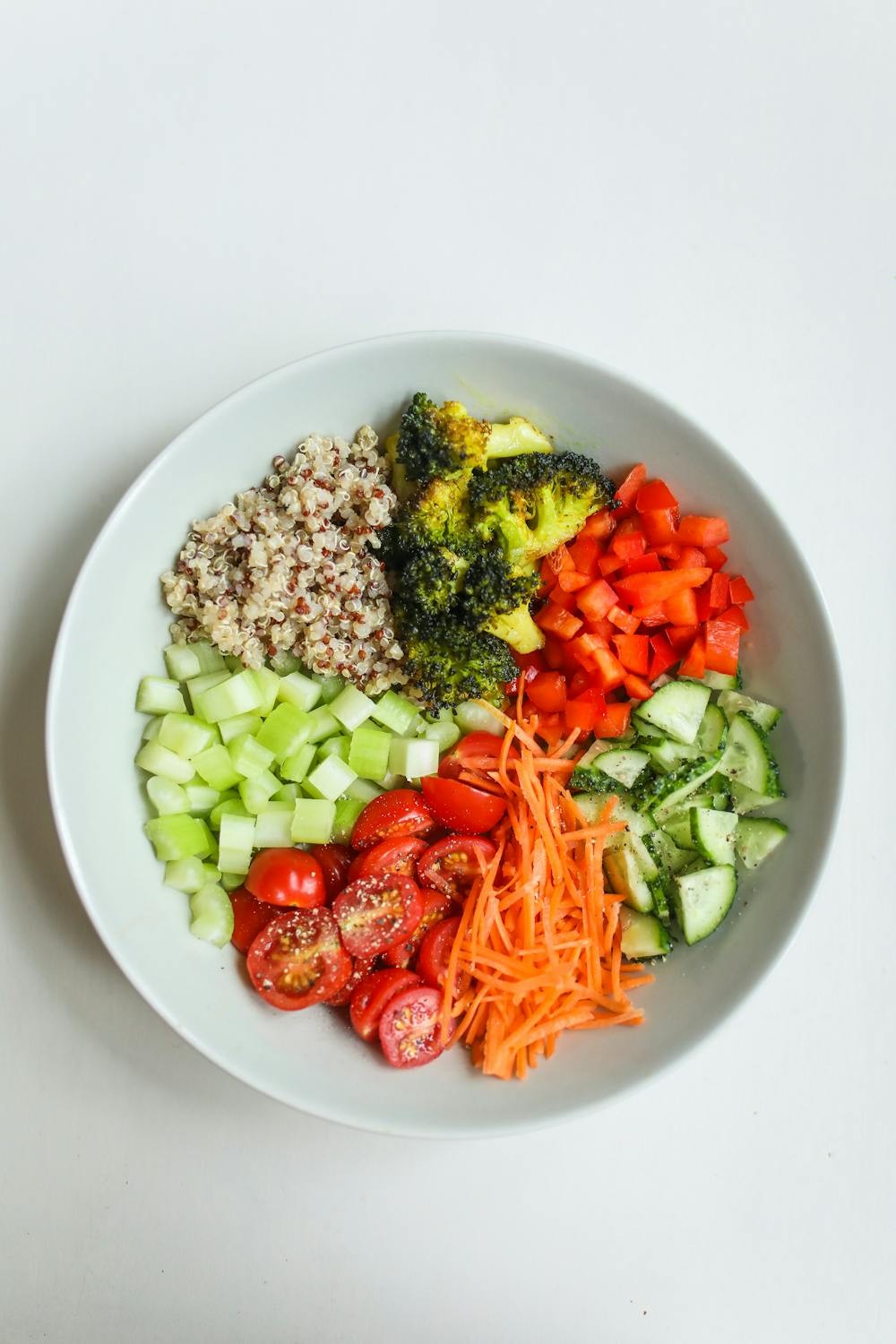Are you struggling to manage your Irritable Bowel Syndrome (IBS) symptoms through diet? At FOODS.EDU.VN, we understand the challenges of living with IBS and offer expert-backed information to help you identify and incorporate foods that can ease your discomfort and improve your digestive health. Discover actionable strategies and culinary insights to transform your diet and reclaim control over your well-being. This guide includes details of Low-FODMAP diet, gluten-free alternatives, and gut-friendly recipes.
1. Understanding IBS and Its Dietary Triggers
What Exactly Is Irritable Bowel Syndrome (IBS)?
Irritable Bowel Syndrome (IBS) is a common gastrointestinal disorder affecting the large intestine. It’s characterized by symptoms such as abdominal pain, bloating, gas, diarrhea, and constipation. Unlike inflammatory bowel diseases like Crohn’s disease or ulcerative colitis, IBS does not cause changes in bowel tissue or increase your risk of colorectal cancer. According to the Mayo Clinic, IBS is a chronic condition that needs long-term management.
What Are Common Dietary Triggers for IBS?
Common dietary triggers for IBS vary among individuals but often include high-FODMAP foods, gluten, dairy, caffeine, alcohol, and processed foods. High-FODMAP foods are fermentable oligosaccharides, disaccharides, monosaccharides, and polyols, which are poorly absorbed in the small intestine and can cause gas and bloating. The Monash University provides a comprehensive list of FODMAPs to avoid.
How Does Diet Impact IBS Symptoms?
Diet plays a crucial role in managing IBS symptoms. Certain foods can exacerbate symptoms by increasing gas production, altering bowel motility, and affecting the gut microbiota. Identifying and eliminating trigger foods while focusing on a balanced diet can significantly reduce symptom severity and improve quality of life. A study published in the American Journal of Gastroenterology highlighted the effectiveness of dietary interventions in managing IBS symptoms.
2. Foods That Can Help Manage IBS
What Are Some Gut-Friendly Foods to Incorporate Into Your Diet?
Incorporating gut-friendly foods into your diet can help soothe the digestive system and reduce IBS symptoms. These foods include:
- Low-FODMAP Fruits: Blueberries, strawberries, bananas, cantaloupe, grapes.
- Low-FODMAP Vegetables: Carrots, spinach, cucumbers, zucchini, bell peppers.
- Lean Proteins: Chicken, fish, turkey, tofu.
- Gut-Healthy Grains: Oats, quinoa, rice.
What Are the Benefits of Probiotic-Rich Foods for IBS?
Probiotic-rich foods can improve gut health by introducing beneficial bacteria to the digestive system. These bacteria help balance the gut microbiota, reduce inflammation, and improve digestion. Examples of probiotic-rich foods include:
- Yogurt: Choose plain, unsweetened yogurt with live and active cultures.
- Kefir: A fermented milk drink similar to yogurt.
- Sauerkraut: Fermented cabbage that is rich in probiotics.
- Kimchi: A Korean side dish made from fermented vegetables.
- Miso: A traditional Japanese seasoning produced by fermenting soybeans with salt and koji.
Harvard Health Publishing emphasizes the importance of probiotics for digestive health.
How Can Fiber Help With IBS?
Fiber can help manage IBS symptoms, but the type of fiber matters. Soluble fiber, found in foods like oats, carrots, and psyllium, absorbs water and forms a gel-like substance in the digestive tract, which can help regulate bowel movements. Insoluble fiber, found in foods like whole grains and bran, adds bulk to the stool and can help relieve constipation. Start with small amounts of fiber and gradually increase intake to avoid exacerbating symptoms.
3. The Low-FODMAP Diet: A Detailed Guide
What Is the Low-FODMAP Diet and How Does It Work?
The Low-FODMAP diet is an elimination diet designed to reduce the intake of fermentable oligosaccharides, disaccharides, monosaccharides, and polyols. By temporarily restricting these carbohydrates, individuals can determine if FODMAPs are triggering their IBS symptoms. The diet typically involves three phases:
- Elimination Phase: Restricting high-FODMAP foods for 2-6 weeks.
- Reintroduction Phase: Gradually reintroducing FODMAPs one at a time to identify specific triggers.
- Maintenance Phase: Personalizing the diet by avoiding only the identified trigger foods while enjoying a wider variety of foods.
Which Foods Are Allowed on a Low-FODMAP Diet?
During the elimination phase of the Low-FODMAP diet, focus on the following foods:
| Category | Low-FODMAP Options |
|---|---|
| Fruits | Bananas, blueberries, grapes, kiwi, oranges, strawberries |
| Vegetables | Carrots, cucumbers, eggplant, lettuce, potatoes, spinach |
| Grains | Oats, quinoa, rice |
| Protein | Beef, chicken, eggs, fish, tofu |
| Dairy | Lactose-free milk, almond milk, rice milk |
| Nuts & Seeds | Almonds (small portions), chia seeds, pumpkin seeds, walnuts |
| Sweeteners | Maple syrup, stevia |
How to Implement the Low-FODMAP Diet Safely?
Implementing the Low-FODMAP diet safely requires careful planning and guidance. Here are some tips:
- Consult a Dietitian: Work with a registered dietitian to ensure you are meeting your nutritional needs and following the diet correctly.
- Read Labels Carefully: Check food labels for high-FODMAP ingredients like high-fructose corn syrup, honey, and artificial sweeteners.
- Cook at Home: Preparing your own meals allows you to control the ingredients and avoid hidden FODMAPs.
- Keep a Food Diary: Track your food intake and symptoms to identify specific triggers.
4. Foods to Avoid If You Have IBS
What Are Common High-FODMAP Foods to Avoid?
Common high-FODMAP foods to avoid include:
- Fruits: Apples, pears, mangoes, watermelon, cherries.
- Vegetables: Onions, garlic, asparagus, broccoli, cauliflower.
- Dairy: Milk, yogurt, ice cream, soft cheeses.
- Grains: Wheat, rye, barley.
- Legumes: Beans, lentils, chickpeas.
- Sweeteners: High-fructose corn syrup, honey, agave nectar.
How Does Gluten Affect IBS Symptoms?
Gluten, a protein found in wheat, rye, and barley, can trigger IBS symptoms in some individuals. Non-celiac gluten sensitivity (NCGS) is a condition where individuals experience IBS-like symptoms after consuming gluten, even though they do not have celiac disease. Switching to gluten-free alternatives may help alleviate symptoms. The Celiac Disease Foundation provides more information on gluten sensitivity.
Why Should You Limit Processed Foods, Caffeine, and Alcohol?
Processed foods, caffeine, and alcohol can exacerbate IBS symptoms due to their potential to irritate the digestive system. Processed foods often contain high levels of fat, sugar, and additives, which can disrupt gut motility and increase inflammation. Caffeine and alcohol can stimulate the bowels and lead to diarrhea.
5. Creating an IBS-Friendly Meal Plan
What Does a Sample IBS-Friendly Meal Plan Look Like?
A sample IBS-friendly meal plan may include:
- Breakfast: Oatmeal with blueberries and almond milk.
- Lunch: Grilled chicken salad with mixed greens, carrots, cucumbers, and a lemon vinaigrette dressing.
- Dinner: Baked salmon with roasted potatoes and steamed spinach.
- Snacks: Rice cakes with avocado, a handful of almonds, or a banana.
How Can You Modify Recipes to Be IBS-Friendly?
Modifying recipes to be IBS-friendly involves substituting high-FODMAP ingredients with low-FODMAP alternatives. For example:
- Replace: Onion and garlic with garlic-infused oil or asafoetida (hing).
- Use: Lactose-free dairy products or plant-based alternatives.
- Opt for: Gluten-free grains like quinoa or rice.
- Avoid: High-fructose corn syrup and artificial sweeteners.
What Are Some Easy IBS-Friendly Recipes?
Here are some easy IBS-friendly recipes to try:
Low-FODMAP Chicken Stir-Fry
Ingredients:
- 1 lb boneless, skinless chicken breast, cut into bite-sized pieces
- 1 tbsp garlic-infused oil
- 1 cup sliced carrots
- 1 cup sliced bell peppers
- 1 cup sliced zucchini
- 2 tbsp soy sauce (low sodium)
- 1 tbsp rice vinegar
- 1 tsp ginger, grated
- Cooked rice, for serving
Instructions:
- Heat garlic-infused oil in a large skillet or wok over medium-high heat.
- Add chicken and cook until browned and cooked through.
- Add carrots, bell peppers, and zucchini to the skillet and cook until tender-crisp.
- In a small bowl, whisk together soy sauce, rice vinegar, and ginger.
- Pour sauce over the chicken and vegetables and cook until heated through.
- Serve over cooked rice.
Banana and Almond Butter Smoothie
Ingredients:
- 1 frozen banana
- 1 cup almond milk
- 2 tbsp almond butter
- 1 tsp chia seeds
- Optional: spinach for added nutrients
Instructions:
- Combine all ingredients in a blender.
- Blend until smooth and creamy.
- Pour into a glass and enjoy immediately.
6. Managing IBS Beyond Diet
What Other Lifestyle Changes Can Help Manage IBS?
Beyond diet, lifestyle changes such as stress management, regular exercise, and adequate sleep can help manage IBS symptoms. Stress can exacerbate IBS symptoms, so finding ways to relax and reduce stress is crucial. Regular exercise can improve gut motility and reduce bloating. Aim for at least 30 minutes of moderate-intensity exercise most days of the week.
How Does Stress Affect IBS Symptoms?
Stress can disrupt the gut-brain axis, a communication network between the brain and the digestive system. When stressed, the brain can send signals to the gut that trigger inflammation, alter gut motility, and increase sensitivity to pain. Incorporating stress-reduction techniques such as meditation, yoga, or deep breathing exercises can help alleviate IBS symptoms.
Are There Medications That Can Help With IBS?
Several medications can help manage IBS symptoms, including:
- Antispasmodics: Help reduce abdominal cramping and pain.
- Antidiarrheals: Help control diarrhea.
- Laxatives: Help relieve constipation.
- Antidepressants: Can help reduce pain and improve mood.
Always consult with a healthcare provider before starting any new medication.
7. Debunking Common IBS Diet Myths
Is IBS All in Your Head?
No, IBS is not all in your head. While stress and anxiety can exacerbate symptoms, IBS is a real gastrointestinal disorder with physiological causes. These causes may include altered gut motility, visceral hypersensitivity, and changes in the gut microbiota.
Do You Need to Avoid All Dairy If You Have IBS?
Not necessarily. Many people with IBS can tolerate lactose-free dairy products or small amounts of certain cheeses. Experiment with different types of dairy to see what you can tolerate.
Is a Gluten-Free Diet Necessary for All IBS Sufferers?
No, a gluten-free diet is not necessary for all IBS sufferers. Gluten only affects those with celiac disease or non-celiac gluten sensitivity. If you suspect you have gluten sensitivity, consult with a healthcare provider for testing and guidance.
8. Expert Tips for Long-Term IBS Management
How to Maintain a Balanced Diet While Managing IBS?
Maintaining a balanced diet while managing IBS involves focusing on nutrient-dense, low-FODMAP foods and avoiding trigger foods. Work with a registered dietitian to create a personalized meal plan that meets your nutritional needs and minimizes symptoms.
What Are the Benefits of Keeping a Food Diary?
Keeping a food diary can help you identify specific trigger foods and track your symptoms. Record everything you eat and drink, as well as any symptoms you experience, and note the timing and severity of the symptoms. This information can help you make informed decisions about your diet and lifestyle.
How Often Should You Consult a Healthcare Provider for IBS?
Consult a healthcare provider regularly for IBS management, especially if you experience new or worsening symptoms. They can provide guidance on diet, lifestyle changes, and medications, as well as screen for other potential health conditions.
9. The Role of Supplements in IBS Management
Which Supplements Can Help Alleviate IBS Symptoms?
Several supplements may help alleviate IBS symptoms, including:
- Probiotics: Can help balance the gut microbiota and reduce inflammation.
- Peppermint Oil Capsules: Can help relax the muscles in the digestive tract and reduce abdominal pain.
- Fiber Supplements: Can help regulate bowel movements and relieve constipation or diarrhea.
- Vitamin D: Many people with IBS are deficient in vitamin D, which can worsen symptoms.
How to Choose High-Quality Supplements?
Choosing high-quality supplements involves looking for products that have been third-party tested for purity and potency. Check for certifications from organizations like USP, NSF International, or ConsumerLab.com. Also, consult with a healthcare provider before starting any new supplement regimen.
Are There Any Risks Associated With Taking Supplements for IBS?
Yes, there are potential risks associated with taking supplements for IBS. Some supplements can interact with medications or cause side effects. Always consult with a healthcare provider before starting any new supplement regimen, especially if you have underlying health conditions.
10. Resources and Support for People With IBS
What Online Resources Are Available for IBS Sufferers?
Numerous online resources are available for IBS sufferers, including:
- FOODS.EDU.VN: Offers comprehensive information and resources on IBS and dietary management.
- The International Foundation for Gastrointestinal Disorders (IFFGD): Provides information, support, and resources for people with gastrointestinal disorders.
- The Crohn’s & Colitis Foundation: Offers information and support for people with inflammatory bowel diseases, which can sometimes be confused with IBS.
- Monash University FODMAP Blog: Offers information and resources on the low-FODMAP diet.
Are There Support Groups for People With IBS?
Yes, there are support groups for people with IBS. These groups can provide a sense of community and support, as well as opportunities to share experiences and learn from others. Check with local hospitals, clinics, and community centers for information on support groups in your area.
Where Can You Find Registered Dietitians Specializing in IBS?
You can find registered dietitians specializing in IBS through professional organizations like the Academy of Nutrition and Dietetics. Many dietitians also offer virtual consultations, making it easier to access expert guidance from the comfort of your own home.
Navigating IBS can feel overwhelming, but with the right knowledge and strategies, you can manage your symptoms and improve your quality of life. At FOODS.EDU.VN, we are committed to providing you with the tools and resources you need to succeed.
Ready to take control of your IBS? Explore our website at FOODS.EDU.VN for more in-depth articles, delicious IBS-friendly recipes, and expert advice. For personalized support, contact us at 1946 Campus Dr, Hyde Park, NY 12538, United States, or reach out via WhatsApp at +1 845-452-9600. Let FOODS.EDU.VN be your trusted partner in managing IBS and embracing a healthier, happier you.
FAQ: What Foods Are Good for IBS?
1. What is IBS and how does diet affect it?
IBS, or Irritable Bowel Syndrome, is a common disorder that affects the large intestine, causing symptoms like abdominal pain, bloating, gas, diarrhea, and constipation. Diet plays a significant role in managing IBS symptoms, as certain foods can trigger or worsen these issues. Identifying and avoiding trigger foods while focusing on a balanced diet can help reduce symptom severity.
2. What are some gut-friendly foods that can help with IBS?
Gut-friendly foods that are often well-tolerated by individuals with IBS include low-FODMAP fruits like bananas, blueberries, and grapes; low-FODMAP vegetables like carrots, spinach, and cucumbers; lean proteins such as chicken and fish; and gut-healthy grains like oats, quinoa, and rice. Probiotic-rich foods like yogurt and kefir can also support gut health.
3. What is the Low-FODMAP diet and how can it help with IBS?
The Low-FODMAP diet is an eating plan designed to reduce the intake of fermentable oligosaccharides, disaccharides, monosaccharides, and polyols (FODMAPs). This diet helps identify specific trigger foods by temporarily restricting high-FODMAP items and then gradually reintroducing them to monitor symptom response, ultimately leading to a personalized eating plan.
4. What foods should be avoided on a Low-FODMAP diet?
On a Low-FODMAP diet, it’s best to avoid high-FODMAP foods like apples, pears, onions, garlic, wheat, rye, beans, lentils, and high-fructose corn syrup. These foods are poorly absorbed in the small intestine and can cause gas, bloating, and other digestive issues.
5. How does gluten affect IBS symptoms?
Gluten, a protein found in wheat, rye, and barley, can trigger IBS symptoms in some individuals, even if they don’t have celiac disease. This condition is known as non-celiac gluten sensitivity (NCGS). Switching to gluten-free alternatives may help alleviate symptoms for those with gluten sensitivity.
6. Why are processed foods, caffeine, and alcohol often problematic for people with IBS?
Processed foods are often high in fat, sugar, and additives that can disrupt gut motility and increase inflammation. Caffeine and alcohol can stimulate the bowels and lead to diarrhea. Limiting these substances can help reduce IBS symptoms.
7. What lifestyle changes, besides diet, can help manage IBS?
Besides diet, lifestyle changes such as stress management, regular exercise, and adequate sleep can help manage IBS symptoms. Stress can disrupt the gut-brain axis, exacerbating symptoms, while exercise can improve gut motility, and sufficient sleep supports overall health.
8. Can probiotics help with IBS symptoms?
Yes, probiotics can help with IBS symptoms. Probiotics introduce beneficial bacteria into the digestive system, helping to balance the gut microbiota, reduce inflammation, and improve digestion. Foods like yogurt, kefir, sauerkraut, and kimchi are good sources of probiotics.
9. Are there any risks associated with taking supplements for IBS?
Yes, there are potential risks associated with taking supplements for IBS. Some supplements can interact with medications or cause side effects. It is important to consult with a healthcare provider before starting any new supplement regimen, especially if you have underlying health conditions.


